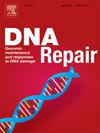DNA repair at the crossroads of tumor immunogenicity and cancer therapy: Harnessing innate and adaptive immune pathways for improved therapeutic outcomes
IF 2.7
3区 生物学
Q2 GENETICS & HEREDITY
引用次数: 0
Abstract
Immunotherapy has revolutionized cancer treatment, particularly with immune checkpoint inhibitors (ICIs), which harness the immune system to achieve durable antitumor responses. DNA repair pathways, essential for maintaining genomic stability, play a complex role in cancer. While functional DNA repair prevents tumorigenesis, deficiencies in pathways such as homologous recombination (HR), mismatch repair (MMR), and non-homologous end joining (NHEJ) can amplify tumor immunogenicity. These deficiencies increase tumor mutational burden, generate neoantigens, and activate innate immune sensors like cGAS–STING and RIG-I/MDA5-MAVS. Therapies such as radiotherapy and chemotherapy can enhance these effects by inducing DNA damage and de-repressing endogenous retroviral elements, creating a "viral mimicry" state that promotes immune recognition. Thus, combining DNA repair inhibitors with cytotoxic therapies and immunotherapy has emerged as a promising strategy to enhance antitumor immunity. This review highlights mechanisms by which DNA repair defects and genotoxic stress activate innate immunity, improve antigen presentation, and foster T-cell activation. Emerging approaches integrating PARP and ATM/ATR inhibitors with ICIs, STING agonists, and cancer vaccines offer potential to overcome immune resistance. Personalized combinations tailored to tumor-specific DNA repair and immune profiles hold promises for transforming cancer treatment, with ongoing research aimed at optimizing therapeutic efficacy while minimizing toxicity.
DNA修复在肿瘤免疫原性和癌症治疗的十字路口:利用先天和适应性免疫途径改善治疗效果
免疫疗法已经彻底改变了癌症治疗,特别是免疫检查点抑制剂(ICIs),它利用免疫系统实现持久的抗肿瘤反应。DNA修复途径对维持基因组稳定性至关重要,在癌症中发挥着复杂的作用。虽然功能性DNA修复可以阻止肿瘤发生,但同源重组(HR)、错配修复(MMR)和非同源末端连接(NHEJ)等途径的缺陷可以增强肿瘤的免疫原性。这些缺陷增加肿瘤突变负担,产生新抗原,并激活先天免疫传感器,如cGAS-STING和RIG-I/MDA5-MAVS。放疗和化疗等疗法可以通过诱导DNA损伤和抑制内源性逆转录病毒元素来增强这些效果,从而产生一种促进免疫识别的“病毒模仿”状态。因此,将DNA修复抑制剂与细胞毒性疗法和免疫疗法相结合已成为增强抗肿瘤免疫的一种有希望的策略。本文综述了DNA修复缺陷和基因毒性应激激活先天免疫、改善抗原呈递和促进t细胞活化的机制。将PARP和ATM/ATR抑制剂与ICIs、STING激动剂和癌症疫苗结合的新方法提供了克服免疫耐药性的潜力。针对肿瘤特异性DNA修复和免疫图谱量身定制的个性化组合有望改变癌症治疗,目前正在进行的研究旨在优化治疗效果,同时将毒性降到最低。
本文章由计算机程序翻译,如有差异,请以英文原文为准。
求助全文
约1分钟内获得全文
求助全文
来源期刊

DNA Repair
生物-毒理学
CiteScore
7.60
自引率
5.30%
发文量
91
审稿时长
59 days
期刊介绍:
DNA Repair provides a forum for the comprehensive coverage of DNA repair and cellular responses to DNA damage. The journal publishes original observations on genetic, cellular, biochemical, structural and molecular aspects of DNA repair, mutagenesis, cell cycle regulation, apoptosis and other biological responses in cells exposed to genomic insult, as well as their relationship to human disease.
DNA Repair publishes full-length research articles, brief reports on research, and reviews. The journal welcomes articles describing databases, methods and new technologies supporting research on DNA repair and responses to DNA damage. Letters to the Editor, hot topics and classics in DNA repair, historical reflections, book reviews and meeting reports also will be considered for publication.
 求助内容:
求助内容: 应助结果提醒方式:
应助结果提醒方式:


